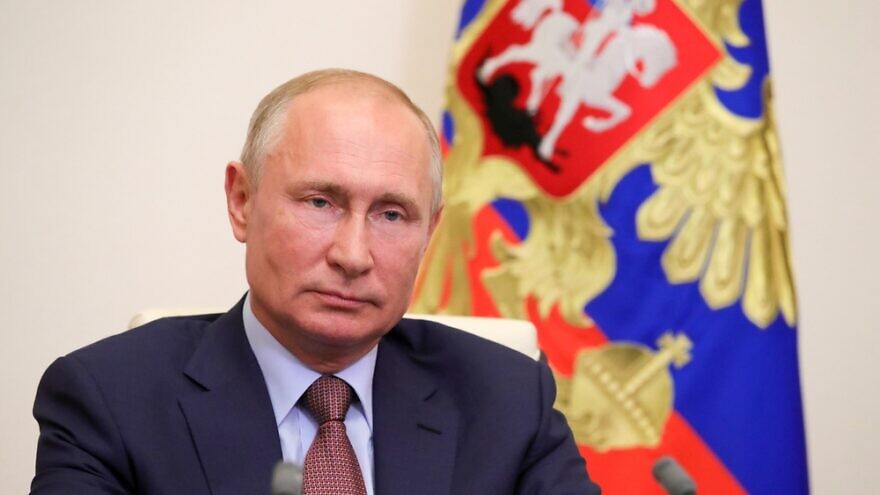Jews and dictators normally don’t get along. History is replete with examples of strongmen who reviled the Jewish communities in their midst. Many of their names spring easily to mind, like Hitler, Stalin and Mussolini, along with the Assads, Saddam Husseins and Gaddafis of the Middle East, all of whom regarded Jews as being at the heart of the devilish conspiracies against their totalitarian dystopias.
More fundamentally, societies ruled by unaccountable, opaque politicians preserve themselves by finding enemies where none exist. That is another reason why Jews, easily visible and practically powerless, too readily come into the frame, though other minority groups have proven vulnerable to this strategy too.
Russian dictator Vladimir Putin has all of Cromwell’s ruthlessness — along with the ruthlessness exhibited by more contemporary autocrats — and he is similarly benign in his attitude towards Jews, despite ruling over the nation that gave us the Pale of Settlement, the Black Hundreds, the fabricated “Protocols of the Elders of Zion,” the Doctors’ Plot and numerous other episodes of violent, dangerous hatred of Jews. But rather than copying that playbook, Putin has gone in the opposite direction, officially frowning upon anti-Semitism while nurturing close relations with both Israel and loyal Jewish leaders around Russia. What’s striking is that this approach coexists with his imperial, aggressive foreign policy, symbolized by the brutal invasion of Ukraine and the active cultivation of shrill anti-Western conspiracy theories — conditions in which anti-Semitism normally thrives.
How did this situation come about? On a personal level, Putin is certainly unaffected by the Biblical fervor that drove Oliver Cromwell to welcome Jews into his midst. Over the years, various stories have surfaced about the positive influence of Jews whom Putin befriended during his career, along with more outlandish theories holding that he himself is Jewish, but those provide a very limited and tendentious understanding of why he apparently regards Jews with favor.
“Under the current political regime, spreading antisemitic conspiracy theories is out of fashion,” wrote its author, Ilya Yablokov.
Surveying the three decades that followed the dissolution of the USSR in 1991, Yablokov arrived at a critical observation. During the 1990s, when Russia was in economic free-fall but liberal democracy seemed to be in the ascendant, both antisemitic discourse and hate crimes targeting Jews were rife. But in the early 2000s, with Putin already ensconced in place and authoritarian rule encroaching, the antisemitic invective of the various neo-pagans, ultranationalists and communists who littered the previous decade was replaced with a shift towards conspiracy theories focused on the West. Within 20 years, wrote Yablokov, “anti-Western conspiracy theories were a popular trope used to explain events both in Russia and globally, to justify action against the political opposition, and to shift blame for the Kremlin’s unpopular policies.”
The political utility of obsessively attacking the West along with the Kremlin’s own commitment to, as Yablokov puts it, “preserve the image of Russia as a nation that cherishes its multi-ethnic character,” obviates any need for anti-Semitism as a mobilizing tool in the Putin era. As Yablokov argues, that amounts to “rare good news from Russia.”
Yet it does not follow that Jews (unless they happen to be resident in Russia) should be on the spectrum from neutral to positive in their attitudes to Putin. Following the defeat of Nazi Germany in 1945, Jews finally enjoyed an unprecedented flowering, cemented by the establishment of a Jewish democratic state and the confident participation of Diaspora Jewish communities in the political, cultural and commercial lives of their countries. Such a flowering was — and remains — possible only within the framework of liberal democracies like the U.S. and Western Europe for one very good reason. Liberal democracy enables Jews to organize as a community, and to speak out without fear, without needing an authoritarian protector to lord it over them.
However, a protector is exactly what the 200,000-odd Jews who live in Russia have in Putin. Due to that, their position is far more precarious than ours in America. As Yablokov points out, while anti-Semitism in Russia has taken a back seat under Putin, it is still present — and can be invoked should conditions suit. Moreover, Putin already has a nasty habit of citing Nazism and the Holocaust to justify his aggression against Ukraine, and he has cynically highlighted the historic antisemitism in Ukraine to bolster his delegitimization campaign against his neighbor. That rhetoric is sure to intensify, and any Jewish discomfort with Putin’s appropriation of the Holocaust for his war strategy will not be regarded sympathetically in the Kremlin.
As Jews living in the West, we owe it to ourselves and our fellow citizens to oppose Putin’s imperial project with every fiber of our beings. This is one occasion when we cannot look to Israel for guidance, because the Jewish state has its own set of interests to balance with the Russians; the hardnosed realpolitik that has often characterized Israeli foreign policy is no less appropriate in this context after all. But Diaspora communities know full well the benefits of the liberal democratic order that Russia and its ally China have dedicated themselves to destroying. As we enter a new phase of great power conflict, we must treasure that knowledge in both heart and mind, and act upon it.


























